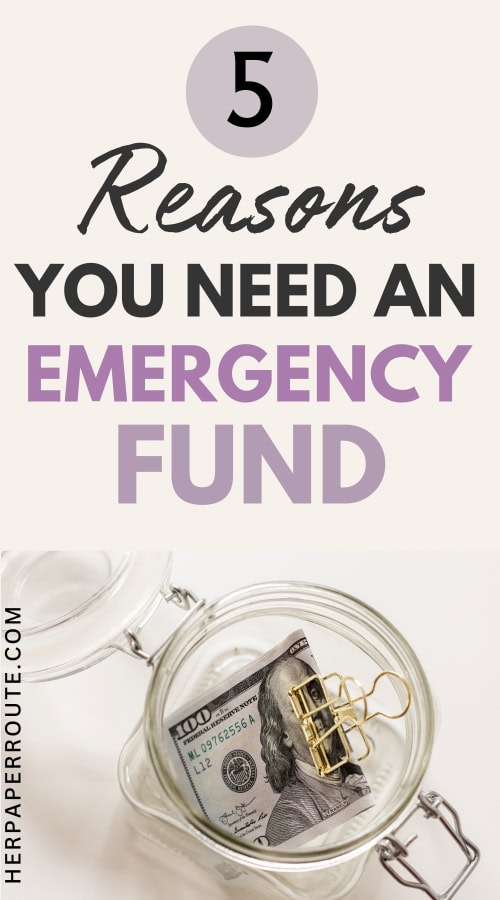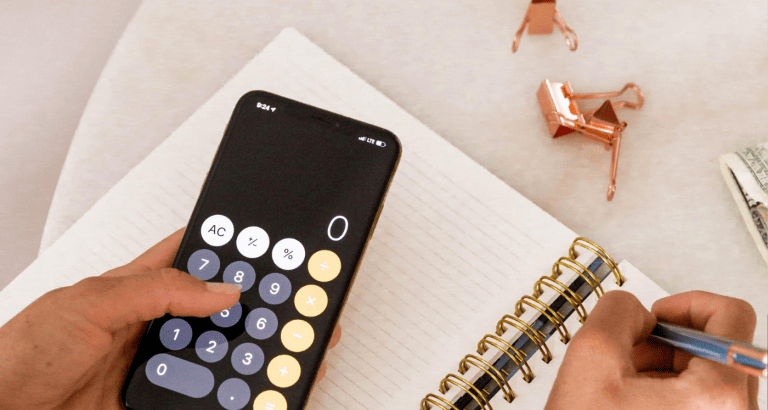Emergency Fund Examples: 5 Reasons You Need One

Surveys have shown that more and more Americans, particularly millennials, have hardly any savings. Having an ingrained savings culture is so important no matter what your income level.
I like to teach people about living within their means and building up an emergency fund. In case you didn’t know, an emergency fund is made up of money you save away for a rainy day.
As an affiliate partner of various brands and sponsored content, HerPaperRoute may earn commission on qualifying purchases. Disclaimer
In this article, I’m going to share more on what an emergency fund is and how you can get started with one if you haven’t already. I’ll also cover some common emergency fund use examples and scenarios where having an emergency fund can save the day.

What Is An Emergency Fund?
Put simply, an emergency fund is a personal fund that you create and put money aside for unexpected but immediate financial need. You can never plan for a financial surprise like needing surgery or your car breaking down.
You can plan for your emergency fund though. It’s money that is there to be used only in the case of an emergency.
Emergency funds aren’t for the small things that pop up in your budget. Those should be able to be covered using your paycheck.
Emergency funds are for large expenses that your monthly budget can’t absorb and you don’t have time to save up for the expense.
Related: Emergency Fund vs Savings – Which Do You Need Right Now?
Examples Where You Need an Emergency Fund
No one likes to think or anticipate challenges, but that is the nature of life. There can be all kinds of different scenarios that call for emergency money to be readily available.
Here are five examples of situations when you need an emergency fund to pull from. The needs might be immediate or over time, but having money to cover them can make a world of difference.
Thanks to your forward-thinking, if you have an emergency fund, you’ll already have the solution to your current financial problem and enjoy a greater sense of peace of mind.
1. Lost Job or Source of Income
Job security is what we all long for, but who can really foresee what the future holds? Global economic crises, business struggles, company mergers, and restructuring are all some of the things that can bring even the best job to an end.
I am also going to point out that all of these examples are completely out of your control. There are also many situations where your actions or lack of action cost you your job, like failing to stay on task or meet deadlines.
Regardless of why someone finds themselves without their source of income, be it a formal job or an entrepreneurial endeavor, life can change very quickly. Without the usual paycheck coming at the end of the month to cover rent, mortgage, car payments, groceries, and all other expenses, you need some savings to carry you through.
Finding a new job can take some time, so you need to have a few months’ living expenses saved up for your emergency fund. Some experts recommend at least six, and others push for a whole year.
After you lose a job is a very difficult period as you start the job search all over and look for ways to bring down your monthly expenses to a minimum until you have a source of income again. Having an emergency fund in place to cover the essentials makes life less stressful.
2. Car Breakdown
We are a society that relies heavily on being mobile. Many jobs require you to have your own vehicle and be able to travel for the job.
For the self-employed and the independent contractors doing ride-share, a car can be a cash cow or the thing that connects them to it. Depending on where you live, you may have to commute a considerable distance to and from work every day.
Having your own vehicle also helps you maintain a packed family and social life with little restriction in terms of what you can access and what times. In many places, public transportation options such as buses, trains, and subways have limited reach and operating hours.
If you experience a car breakdown and your car is crucial for your lifestyle and the work you do, getting your car back on the road becomes your highest priority. Without your car, you may have to look at carpooling, ridesharing options, public transportation, or even a car rental.
All of these options could work to some extent, but there are limits. You might not be able to get a ride when you need to get somewhere or perhaps public transportation takes far longer. It could also be that the costs are beyond your budget if you have to rent a car.
A service need or an accident can cause a car breakdown. The damage and cost of the repair can vary. Ideally, you hope that your car insurance can cover all or most of it.
If you don’t have full coverage, you might have to pay a considerable amount out of pocket. If your car was involved in an accident, the damage could be minor, or the car might be totaled.
In the latter case, you might get a bit of money from the salvage value, but then comes the dilemma of finding a replacement. Usually, you won’t get enough money to buy a new car, just a similar make and model used car.
An emergency fund can make all the difference when you have a car breakdown. You can use some of it to pay for repairs, put down a downpayment on a replacement, or even buy a new car in cash to keep you mobile.
3. Sudden Medical Need
Unexpected medical needs are a third reason why you need to have some money saved up. These can come in any shape and size.
You may need an immediate operation, for example, or long-term treatment. In the ideal scenario, your health insurance plan should be able to cover your medical needs or those of your dependents.
If your plan doesn’t include comprehensive coverage, then you might have to have the cash to make up the difference. Most health insurance plans have a copay, deductible, and max out of pocket cost that you’ll need to account for.
Whether you need medical attention from a doctor, specialist, dentist, or other medical professional, many times, you need it immediately. If you or a family member has an illness, accident, or other medical issue come up, your emergency fund can grant you quick access to the medical services you need.
4. Home Repairs
If you are a homeowner, then the costs of repair and maintenance fall on you. Extreme weather such as hurricanes, strong winds, and storms can cause major home damage.
When insurance doesn’t completely cover these costs, you are going to need the disposable income to pay for the repairs. Many times, these can be urgent so that you can protect the insides of the home from additional damage like mold or being open to the elements.
Other house repair needs can include the breakdown of your heating and cooling system in cold winters or hot summers. A working HVAC system is a necessity in most areas of the United States.
While you might not have been able to anticipate the breakdown, you have to address it urgently. Other appliances and home items such as a stove, fridge, washing machine, gate, garage door, and security system may all need attention at one point or another. It helps to have money to use when the need arises.
5. Family Emergencies
As a member of a family, you share some responsibilities. When a financial need arises for a family member, you may need to step in, whether or not this is a direct dependent of yours or someone covered on your insurance plan.
Family emergencies can be any of the situations above, such as medical, car, house, or job loss. When someone you care for deeply is facing a crisis, you want to be able to step in and lend a helping hand to help them get through it. Many times, financial assistance may be required.
Where To Find Money If You Don’t Have An Emergency Fund?
When you need money quickly, there are usually a few options available. The first and best-case scenario is that you have been saving a bit of your income every month for some time and have your own emergency fund.
The second best option is to divert the money you intended for other purposes towards the emergency itself if your savings aren’t up to par. This could be money for other bills, money you wanted to invest, grocery money, or entertainment. Any loose cash comes in handy when you need money immediately.
When you are not able to cover the costs of the emergency yourself, you may be forced to look to other people or institutions to bail you out. If you have a friend or family member who can come to your rescue with a loan, then that is a good option.
If this is not available, you can also look into getting a loan. Whenever you take out a loan, you have to consider the terms, especially the interest payments. While you may be desperate at the moment, at some point, you are going to have to deal with potentially high-interest rates and the opportunity costs associated with them.
Where Should I Put My Emergency Fund?
The best place to keep your emergency fund is in a separate savings account. This way it’s not mixed with your checking account that you regularly pull money from.
Separating it so that it is not too easily accessible is a vital step. If your emergency fund is at a separate bank, then it may take a day for the money to get transferred which keeps using it for everyday purchases less tempting.
On the flip side, you don’t want to keep your emergency fund money in an investment such as the stock market, for example. There are two reasons very good reasons for that.
First, money that is invested may not be available immediately when you need it, defeating the purpose of the fund. Second, you want your emergency money safe from the normal risk associated with various types of investments.
When Should You Create An Emergency Fund?
You can create an emergency fund at any point that you wish, regardless of your income type or level. The best time to start is yesterday, and the second-best time to start is today.
Planning is an important part of the process. You need to decide ahead of time how much money you want to put into your fund every month.
One of the mistakes I’ve seen with many eager people ready to get started is aiming too high. For example, if you decide to set aside $300 every month towards your emergency fund, this should be money that you can spare and afford.
You don’t want to find yourself in a situation where you have to tap into the fund for living expenses and other immediate non-emergency wants and needs.
How Much Should Be in Your Emergency Fund?
Finance gurus have come up with many rules and tips for how to figure out how much money you need to stash away for any rainy day. It’s generally recommended that you save between 3-6 months of your expenses in your emergency fund.
With this amount, you’ll have enough money that you could cover your household bills and necessities while you’re looking for a new job. If you’re in a particularly volatile job market, you may even want to save more.
In the end, the recommended amount to have in your emergency fund is up to you. Consider your income, your living expenses, what you can afford, and what is going to give you the right level of buffer you want if you happen to face any storms of life.
How To Start Saving Money for Emergencies
The easiest way to save money is monthly. Starting to save money regularly is an important habit to have, but this should not discourage you from the beginning if you haven’t started yet.
I like to recommend that you start small, wherever you find yourself financially. Cut back on small purchases that you make and instead divert that money into savings.
As you start to build up a savings habit and create the systems to keep yourself accountable and on track, you are going to be proud of the progress you’ve made a few months or a year down the line.
Final Thoughts
It’s essential to build up the discipline to handle finances the right way. It takes focus and discipline to save money and to live within your means. It also takes discipline to forgo entertainment, a vacation, or some take-out, to make sure you have an emergency fund.
Even if you have never started an emergency fund or have depleted the one you have, you can always start from where you are. Every little bit counts, so don’t wait until you have a huge income to start putting money away on a regular basis.
So, decide how much you want in your emergency fund and how much you have to save each month to get there. Give yourself a start date, and open that savings account if you don’t have one already.
I like to recommend that you automate your savings so that you never have to think about it. Set a date for your monthly savings to be automatically transferred to your savings account each month. Your future self is going to thank you.
Related Articles:

Follow along on Instagram!









![Check Stolen From Mail and Cashed [What to Do Right Now!] 11 check stolen from mail and cashed what to do now](https://herpaperroute.com/wp-content/uploads/2022/09/Check-Stolen-From-Mail-and-Cashed-768x410.jpeg)

